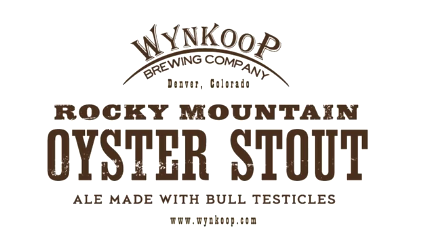
Brown and his co-workers posted a video on YouTube in March 2012 as a joke. In the video, Wynkoop’s idea man Marty Jones explains the brewery’s dedication to pioneering and the use of local ingredients. Meanwhile, Brown and other co-workers provide the humorous bits, such as the mention of a two-per-customer limit.
The video and idea went viral, logging more than 100,000 views and drawing coverage from media outlets across the country, such as The Huffington Post and NBC. Wynkoop received calls at its restaurant and several e-mails per day from interested consumers. Wynkoop never intended to make the beer, but demand, it seems, always wins in the end.
After braving the bureaucratic process of legalizing the ingredient, the brewery first offered Rocky Mountain Oyster Stout, widely known as “The Bull Testicle Beer,” on draft at Denver’s Great American Beer Festival in October. Brown said lines were steady and long for the dark-malted brew. Wynkoop has since offered the beer on draft at its brewpub. Cans are on the way. It remains to be seen, however, if this beer is a trailblazer for craft brewers or something else entirely.
“I think it’s a bit of a novelty,” Brown said.
Perhaps, but at one time beers brewed with fruit, coffee, chocolate and chili peppers were once considered strange, innovative, and rare enough to be eye-catching. Now, as craft breweries have swarmed states from coast to coast at a near-daily rate (there are 2,336 breweries in the U.S. as of Jan. 11), these once-exotic styles have become the standard.
“Almost every ingredient you can think of, someone has already done,” Brown said.
Take Flying Dog Brewery, based in Frederick, Md., which prides itself as a pioneer of beer styles. Its menu of beers features Horn Dog Barley Wine, a seasonal with hints of figs, dates and raisins, The Fear Imperial Pumpkin Ale, a limited edition offering made with local pumpkin puree, and Green Tea Imperial Stout, which is part of the brewhouse rarities series, to name a few.
Matt Brophy, Flying Dog’s brewmaster and COO, admitted that innovation has become more and more difficult as the years pass, however he said that all the trial and error is worth the effort.
“Every once in awhile, you kind of hit on something that everybody is raving about,” he said.
Brophy said that when he’s on the road offering samples of new recipes, most people shower him with praise. It’s hard to lose when many of these people are simply honored to be in the presence of someone who does this kind of thing for a living. However, certain new styles bring out a different kind of response from people.
In 2009, Flying Dog launched Raging Bitch, a Belgian-style IPA that packs, as the brewery’s website notes, a sweet malt body contrasted with pine and grapefruit hop flavors and exotic fruit yeast notes. Brophy said that he sampled the beer at the Brickskeller, now known as the Bier Baron, in Washington D.C., and said that there was a noticeable buzz. Unsolicited, drinkers were emphatic about their adoration for the brew.
“It became somewhat of a no-brainer to bring it to the production level,” Brophy said.
Raging Bitch is now one of 10 year-round offerings from Flying Dog.
When asked about Wynkoop’s Rocky Mountain Oyster Stout, Brophy compared the gimmicky nature to an aspect of Flying Dog’s own Lucky SOB Irish Red Ale. Brewed with rich malt flavors and a subtle hop note, the beer is released in time for St. Patty’s Day every year. Brophy takes pride in the beer and its quaffable state. However the beer is also brewed with real four-leaf clovers; not for taste, but for fun. Brophy said he sometimes tells people to drink the beer for good luck.
“Is that gimmicky? It could be described as such,” Brophy said. “But we look at it as just having fun.”
Good old fashioned fun, as corny as it may sound, is a key part to the process for many brewers. Not only do funky styles of beer help brewers enjoy their art and learn new brewing processes, but they also help consumers expand their palates.
“I see people’s opinions as rubber bands,” Brown said. “If you stretch them past where they’re comfortable, they’ll stay a little stretched out.”
Yet that doesn’t mean that all left-field ideas are bankable. Brown said that while he likes pushing consumers to try new things, he also likes giving them what they want. He doesn’t follow the beer geeks, who scour the internet to satisfy their cravings for anything different. Rather, he thinks that brewers will soon start to focus on consistent, quality beers that sell, knowing that everything has already been tried and that, in his opinion, most beer drinkers already have an idea of how something will taste before tasting it. Take the Rocky Mountain Oyster Stout. Sure, the idea became an internet sensation and a strong marketing tool for Wynkoop. But what about the beer itself?
“I wouldn’t say the draft sales have been exploding,” Brown said.
Brown said that he’ll always try to innovate with styles, regardless of what actually goes to the market. Meanwhile at Flying Dog, Brophy said that new styles will remain a core part of the brewery’s future. He hopes that Flying Dog’s rarity series, which allows anyone in the organization to pitch a beer concept, and the single hop series, which enables the brewers to study the characteristics of hops, will maintain the brewery’s pioneering spirit. However, Brophy said that it’s mostly the people at Flying Dog that encourage innovation.
“When you have creative individuals,” he said, “you give them an outlet for their creativity, you celebrate your product on a daily basis, and enjoy it on a daily basis, it keeps that culture intact within the brewing organization.”
